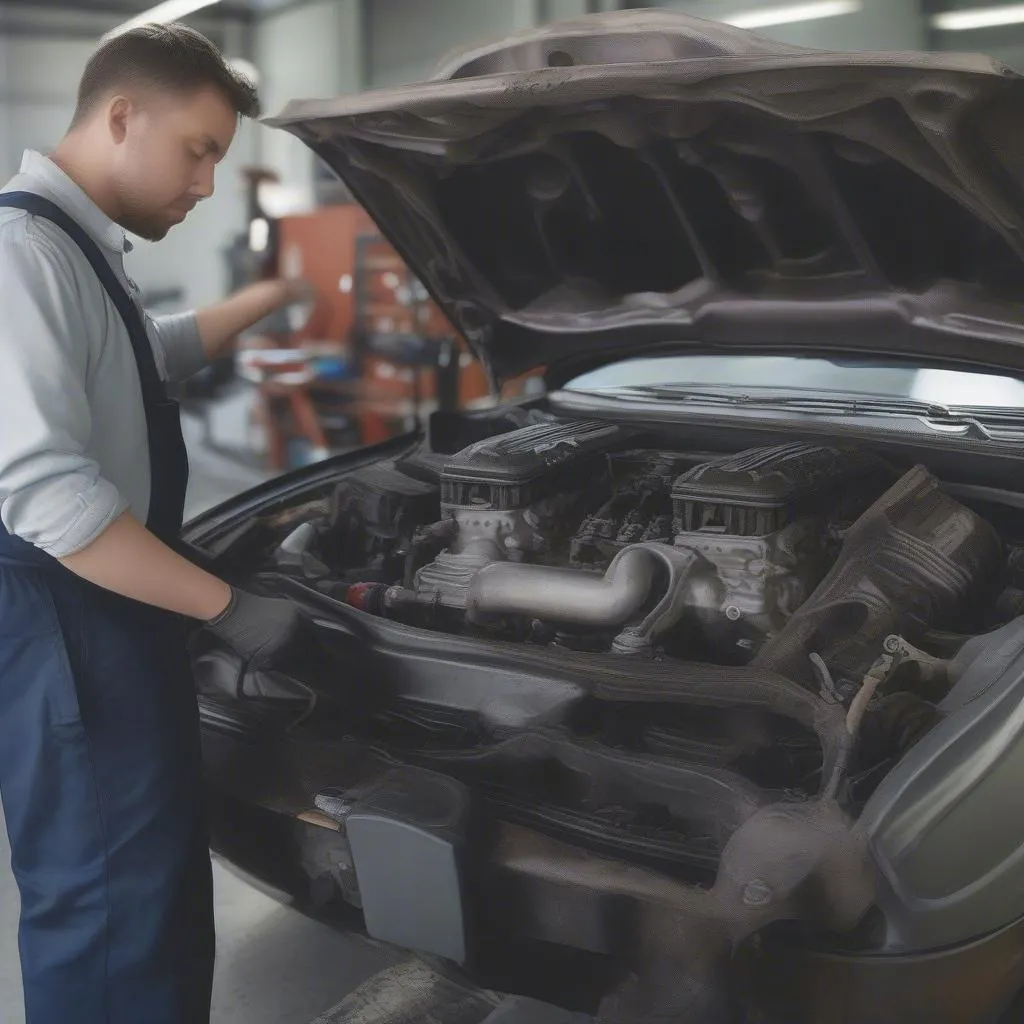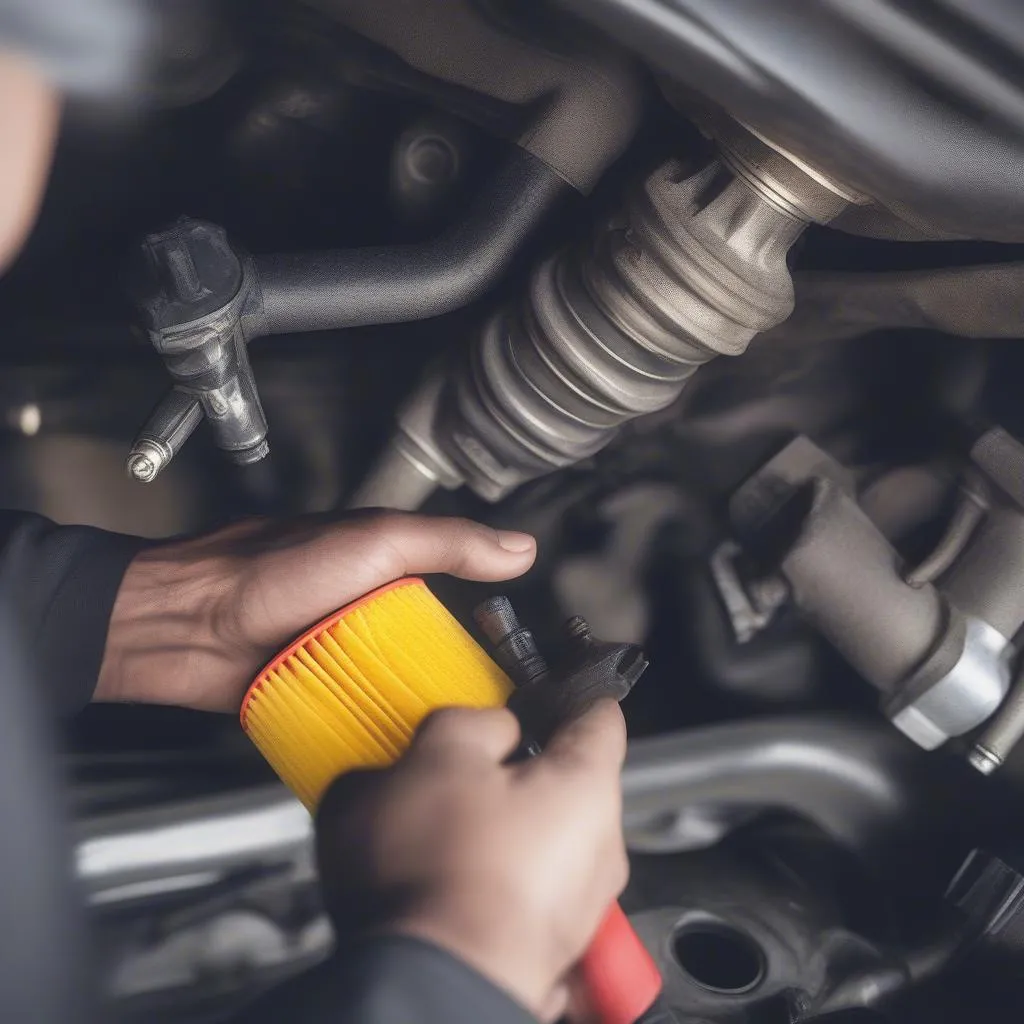Imagine this: You’re driving down the road, enjoying a scenic drive, and suddenly your car jerks, sputters, and loses power. You’re stuck on the side of the road, feeling frustrated and helpless. This scenario, unfortunately, isn’t uncommon. Cars can seize up for a variety of reasons, often leaving drivers stranded and scrambling for solutions.
Understanding a Car Seizing Up: A Mechanic’s Perspective
From a mechanic’s perspective, a “car seized up” typically means the engine has stopped running due to a mechanical issue. It’s like a machine grinding to a halt, unable to move forward.
Here are some reasons why a car might seize up:
- Engine Problems: The engine is the heart of your car. If it’s not functioning properly, your car won’t be able to move. A common culprit is a blown head gasket, which can lead to overheating and engine failure.
- Fuel System Issues: A lack of fuel or a clogged fuel filter can prevent your car from running smoothly.
- Electrical Problems: A faulty ignition system or a dead battery can also cause your car to seize up.
- Transmission Problems: A damaged transmission, which transmits power from the engine to the wheels, can lead to a loss of power and eventually a complete stall.
What to Do When Your Car Seizes Up
First and foremost, safety should be your priority. Pull over to a safe location, turn on your hazard lights, and assess the situation. If possible, try to restart your car.
Here’s what you can do:
- Check the Engine: Look for any visible signs of damage or leaks. A quick check might reveal an obvious issue like a broken belt or a loose hose.
- Check for Fuel: If you have a fuel gauge, make sure it’s not reading empty.
- Check the Battery: If your battery is dead, you might need to jump-start your car or call for roadside assistance.
Remember: If you can’t diagnose the problem or are uncomfortable attempting to fix it, call a qualified mechanic.
Preventing Car Seizing Up: A Proactive Approach
Regular car maintenance is key to preventing your car from seizing up.
Here are some tips:
- Keep Up with Oil Changes: Oil lubricates the engine, preventing friction and wear.
- Replace Air Filters: A dirty air filter can restrict airflow to the engine, affecting performance.
- Inspect Belts and Hoses: Regular inspections can identify worn or damaged parts before they cause problems.
- Check Fluids: Ensure all fluids, including coolant, brake fluid, and power steering fluid, are at the proper levels.
Common Questions About a Car Seizing Up
Here are some commonly asked questions regarding a car seizing up:
Q: Can a seized engine be repaired?
A: In some cases, a seized engine can be repaired. However, it depends on the extent of the damage. Severe damage might necessitate an engine replacement.
Q: Can a car seize up due to a faulty sensor?
A: Yes, a faulty sensor can send incorrect signals to the engine control unit, potentially leading to engine problems and a stall.
Q: What are the warning signs of a car seizing up?
A: Some warning signs include:
- Loss of power while driving
- Engine overheating
- Unusual noises coming from the engine
- Smoke coming from the engine compartment
Q: Can I drive my car if it’s seized up?
A: It’s not advisable to drive your car if it’s seized up. Doing so can cause further damage and put you at risk of a serious accident.
Q: How can I prevent a car from seizing up in the winter?
A: Winter conditions can put added stress on your car. Ensure your battery is in good condition, use a winter-grade oil, and have your car serviced before the winter season.
Need Expert Help?
If you are facing car troubles, don’t hesitate to contact us at Whatsapp: +84767531508. We offer 24/7 support for all your automotive needs, including expert diagnostics and repair.
 Car seized up engine problem: a mechanic inspecting the engine
Car seized up engine problem: a mechanic inspecting the engine
 Car seized up fuel system issue: a mechanic checking the fuel filter
Car seized up fuel system issue: a mechanic checking the fuel filter
Don’t wait until it’s too late! Stay on top of your car maintenance and you’ll reduce the chances of experiencing a seized-up car. If you do find yourself in this situation, remember to stay calm, prioritize safety, and seek professional help when needed.
Looking for more information on car troubles?
- Check out this article on Car On Burn Notice for insights into fire-related issues.
- Learn about Car Fire Columbus Ohio Today for information on recent car fires.
- Discover the causes and solutions for Car Air Conditioner Noise.
- Get the latest updates on NJ Turnpike Car Fire Today.
- Find urgent care near you with our article on Urgent Care In Menifee California.
We encourage you to leave a comment below with any questions or experiences you have with car seizing up. We’d love to hear from you!